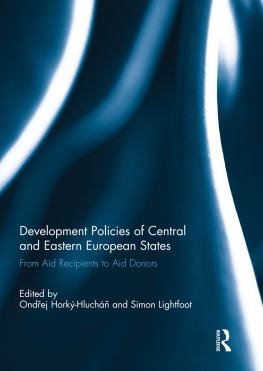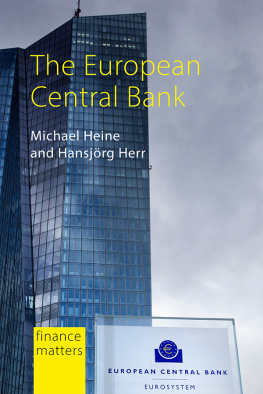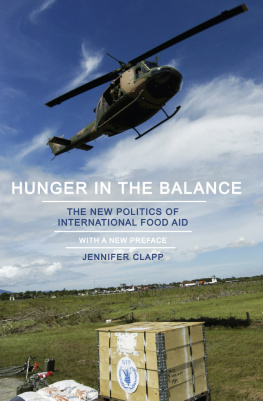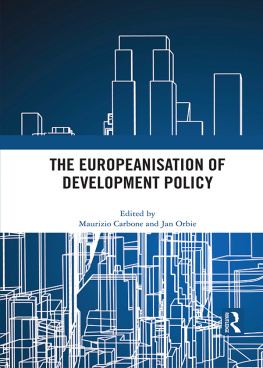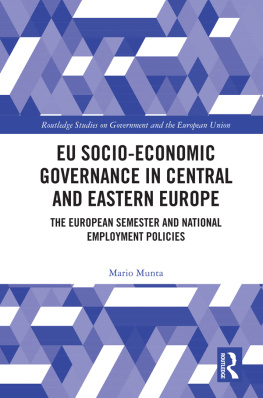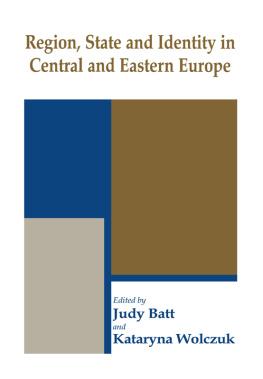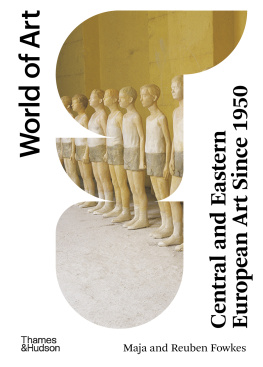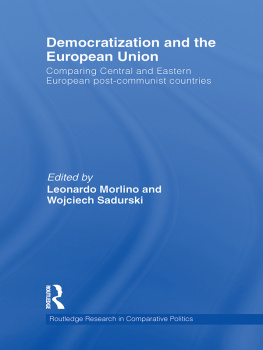Ondrej Horký-Hluchán - Development Policies of Central and Eastern European States: From Aid Recipients to Aid Donors
Here you can read online Ondrej Horký-Hluchán - Development Policies of Central and Eastern European States: From Aid Recipients to Aid Donors full text of the book (entire story) in english for free. Download pdf and epub, get meaning, cover and reviews about this ebook. year: 2012, publisher: Routledge, genre: Politics. Description of the work, (preface) as well as reviews are available. Best literature library LitArk.com created for fans of good reading and offers a wide selection of genres:
Romance novel
Science fiction
Adventure
Detective
Science
History
Home and family
Prose
Art
Politics
Computer
Non-fiction
Religion
Business
Children
Humor
Choose a favorite category and find really read worthwhile books. Enjoy immersion in the world of imagination, feel the emotions of the characters or learn something new for yourself, make an fascinating discovery.
- Book:Development Policies of Central and Eastern European States: From Aid Recipients to Aid Donors
- Author:
- Publisher:Routledge
- Genre:
- Year:2012
- Rating:5 / 5
- Favourites:Add to favourites
- Your mark:
- 100
- 1
- 2
- 3
- 4
- 5
Development Policies of Central and Eastern European States: From Aid Recipients to Aid Donors: summary, description and annotation
We offer to read an annotation, description, summary or preface (depends on what the author of the book "Development Policies of Central and Eastern European States: From Aid Recipients to Aid Donors" wrote himself). If you haven't found the necessary information about the book — write in the comments, we will try to find it.
Ondrej Horký-Hluchán: author's other books
Who wrote Development Policies of Central and Eastern European States: From Aid Recipients to Aid Donors? Find out the surname, the name of the author of the book and a list of all author's works by series.
Development Policies of Central and Eastern European States: From Aid Recipients to Aid Donors — read online for free the complete book (whole text) full work
Below is the text of the book, divided by pages. System saving the place of the last page read, allows you to conveniently read the book "Development Policies of Central and Eastern European States: From Aid Recipients to Aid Donors" online for free, without having to search again every time where you left off. Put a bookmark, and you can go to the page where you finished reading at any time.
Font size:
Interval:
Bookmark:
Director Centre for International Development Issues Nijmegen, Radboud University Nijmegen, The Netherlands
Professor of International Development and Jean Monnet Professor of EU External Relations Director of PhD Programme in Politics, School of Social and Political Sciences, University of Glasgow, Scotland

by Routledge
2 Park Square, Milton Park, Abingdon, Oxon, OX14 4RN
by Routledge
711 Third Avenue, New York, NY 10017
A catalogue record for this book is available from the British Library
by Taylor & Francis Books
The publisher would like to make readers aware that the chapters in this book may be referred to as articles as they are identical to the articles published in the special issue. The publisher accepts responsibility for any inconsistencies that may have arisen in the course of preparing this volume for print.
Ondej Hork & Simon Lightfoot
Perspectives on European Politics and Society, volume 13, issue 1 (April 2012) pp. 1-16
Ondej Hork
Perspectives on European Politics and Society, volume 13, issue 1 (April 2012) pp. 17-32
Dominik Kopiski
Perspectives on European Politics and Society, volume 13, issue 1 (April 2012) pp. 33-49
Balzs Szent-Ivnyi
Perspectives on European Politics and Society, volume 13, issue 1 (April 2012) pp. 50-65
Mirela Oprea
Perspectives on European Politics and Society, volume 13, issue 1 (April 2012) pp. 66-82
Maja Buar
Perspectives on European Politics and Society, volume 13, issue 1 (April 2012) pp. 83-99
Petra Krylov, Miroslav Syrovtka & Zdenk Opral
Perspectives on European Politics and Society, volume 13, issue 1 (April 2012) pp. 100-116
Evelin Andrespok & Andres Ilmar Kasekamp
Perspectives on European Politics and Society, volume 13, issue 1 (April 2012) pp. 117-130
**School of Politics and International Studies, University of Leeds, UK
Font size:
Interval:
Bookmark:
Similar books «Development Policies of Central and Eastern European States: From Aid Recipients to Aid Donors»
Look at similar books to Development Policies of Central and Eastern European States: From Aid Recipients to Aid Donors. We have selected literature similar in name and meaning in the hope of providing readers with more options to find new, interesting, not yet read works.
Discussion, reviews of the book Development Policies of Central and Eastern European States: From Aid Recipients to Aid Donors and just readers' own opinions. Leave your comments, write what you think about the work, its meaning or the main characters. Specify what exactly you liked and what you didn't like, and why you think so.

